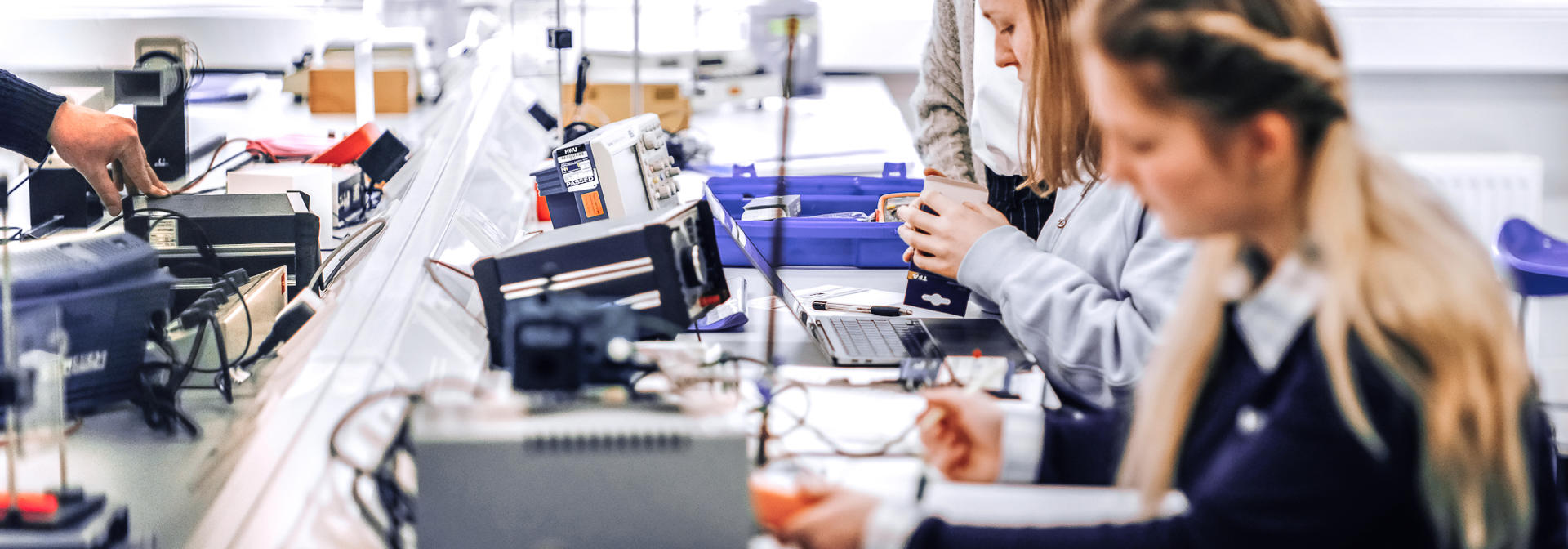Key information
Find out more about our 3 year honours degree option.
- UCAS code
- F300
- Level
- Undergraduate
- Delivery type
- Full Time
- Degree qualification
- BSc (Hons)
- Mode of delivery
- On-Campus
- Duration
- 3-4 years
- Location
- Edinburgh
- Start date
- September
Our Physics BSc programme offers a broad and rigorous education in physics, underpinned by strong computational and mathematical training. These skills are in high demand across cutting-edge industries, from quantum technologies and photonics to renewable energy and advanced manufacturing.
Physics is not just a theoretical discipline — it’s the engine behind many of today’s most transformative technologies. From revolutionising medical imaging and enabling ultra-fast computing to powering green energy solutions and advancing secure communications, physics is at the heart of innovation. This programme shows how physics is applied in real-world contexts, helping you understand how scientific principles are translated into practical technologies that shape our world.
You’ll explore how physics operates beyond the classroom. Through hands-on experiments, computational modelling, and exposure to current research, you’ll gain insight into how physicists solve real-world problems and contribute to emerging sectors.
Whether you're fascinated by the quantum world, the behaviour of light, or the structure of the universe, you’ll develop the ability to measure, model, and predict physical phenomena. Along the way, you’ll build a versatile skillset — including analytical thinking, data analysis, programming, teamwork, and communication — that prepares you for a wide range of careers.
Topics include fields and forces, photonics and optics, and thermal physics. You’ll delve into quantum mechanics, electromagnetism, solid-state physics, and laser technologies, engaging with the same ideas and tools used in frontier research and industrial innovation.
In your final year, you’ll undertake an individual research project, applying your knowledge to a specialised area of experimental, theoretical, or computational physics. This is your opportunity to demonstrate mastery and contribute to the advancement of science and technology.
For students who meet additional entry requirements, a 3-year BSc Physics degree option is also available — offering a faster route into employment or further study.
Heriot-Watt has been ranked second in Scotland for Physics based on student experience by the Guardian (2024). You’ll benefit from a supportive and personal learning environment, where you can engage directly with academic staff, explore developments in the wider physics community, and receive tailored support throughout your studies.
Your student experience
Heriot-Watt University is top in Scotland for Physics research, with 97% of its research classed as world-leading (4*) in the REF 2021 results. The university also received the Queens Anniversary Prize in 2021, the highest honour for universities in the UK, in recognition of our research in Photonics.
Your learning will be informed by the expertise of our research-active physicists, scientists, and academics. You will be taught by passionate and engaging experts who will provide you with insight into emerging topics in quantum technologies, photonics and condensed matter physics, by relating taught material to their own research.
Our degrees are directly informed by the world class research carried out by Heriot-Watt’s Research Institute for Photonic and Quantum Sciences and the Research Institute for Biological Chemistry, Biophysics and Bioengineering. These research Institutes focus on promoting excellence across research themes which include:
The research relevance of this undergraduate programme ensures your studies remain cutting-edge and industry focused.
Go Global
With Go Global, Heriot-Watt's global student programme, you can carry your studies to new places and experience new cultures, expanding your horizons on the way. You'll discover what it means to be a true global citizen and emerge prepared for wherever your career journey will take you.
European Exchange
Course content
September Intake - Edinburgh
Year 1
Provides foundations of physics and mathematics and gives the opportunity to look at wider aspects of physics through experimental study in investigative techniques. Also covered are fundamental engineering skills in electronics and mechanics.
Mandatory September
- Mechanics, Fields and Forces
- Investigative Techniques 1
- Mathematics for Engineers and Scientists 1
Optional September
- Introductory Biology 1
- Principles of Chemistry
- Introduction to Electrical and Electronic Engineering
- Logic and Proof
- Elements of Probability
Mandatory January
- Waves and Matter
- Investigative Techniques 2
- Mathematics for Engineers and Scientists 2
Optional January
- Introductory Biology 2
- Chemical Reactivity
- Introduction to Mechanical Engineering
- Discrete Mathematics
- Topics in Statistical Practice
Year 2
Important themes of physics are introduced through courses in Thermal Physics, Photonics and Optics and Electronics. Experimental, Programming, and Communication skills are developed through practical laboratory activities.
Mandatory September
- Electronics and Programming Skills
- Photonics and Optics
- Mathematics for Engineers and Scientists 3
Optional September
- Chemical Thermodynamics & Introductory Chemical Kinetics
- Elements of Probability
- Logic and Proof
- Astrophysics
Mandatory January
- Experimental Lab and Problem Solving
- Thermal Physics and Properties of Matter
- Mathematics for Engineers and Scientists 4
Optional January
- Cell and Molecular Biology
- Atomic & Molecular Spectroscopy
- Discrete Mathematics
- Topics in Statistical Practice
- Maths Apps and Lab
Year 3
Deals with more advanced treatments of core physics, such as: Electromagnetism; Dynamics and Relativity; and Solid State Physics. Experimental and programming skills are further developed using more in-depth experimental studies.
Mandatory September
- Physical Mathematics 1
- Dynamics and Relativity
- Electromagnetism
- Experimental Labs and Programming Skills
Mandatory January
- Physical Mathematics 2
- Applied Physics
- Quantum Theory and Spectroscopy
- Solid State Physics
Year 4
Deals with more advanced treatments of core physics, such as: Advanced Electromagnetism; Laser Physics; Quantum Concepts; and Solid State Physics. Students can choose from specialist topics including Optical Sensing and Optoelectronics.
Mandatory September
- Electromagnetism and Laser Physics
- Numerical Modelling and Data Analysis
- Quantum Theory & Solid State
Mandatory January
- Problem Solving
- Statistical, Nuclear & Particle Physics
- Optical Sensing and Energy Studies
Mandatory AY
- Independent Research Project
Disclaimer
The courses mentioned above may change between now and the time that you study. For more information, please view our Terms and Conditions.
Programme Video
Why does the world need physics?
See the big picture: quantum and photonics at Heriot-Watt
Student testimonials

Berke's story
Graduate, Physics BSc (Hons)
Heriot-Watt gave me the opportunity to learn how to learn and figure out how I can best develop myself. I was encouraged to take initiative whenever possible and that has served me more times than I can count throughout my career.See more
See moreThe well-structured courses, close contact with lecturers, and the support of ambitious peers created an environment where I could thrive. Heriot-Watt nurtured my curiosity for science and research, helping me grow both academically and personally.
Fees and funding
| Status | Fee |
|---|---|
| Scotland | Paid by SAAS |
| England / Wales / N Ireland / Rep of Ireland | £9,790 |
| International | £25,808 |
- Status: Your residency status is usually defined as the country where you have been ordinarily resident for the three years before the start of your course.
- International: 'International' includes applicants from European Union countries who do not hold Pre-Settled or Settled status in UK. (This does not include students from the Republic of Ireland - see above).
Scholarships and bursaries
Bursaries for students from England, Northern Ireland or Wales
In addition to government loans and grants towards the costs of fees and living costs, we are offering generous financial support to attract and support eligible undergraduate students from England, Northern Ireland or Wales:
- Heriot-Watt University Bursary (up to £3,100 per year)
Entry requirements
We have standard entry requirements for all of our courses that you will have to meet.
Year 1
Standard entry requirements
- Highers AABB (over two sittings). Must include Physics and Maths, with one at A.
- A-Levels BBC. Must include Physics and Maths, with both achieved at B.
- International Baccalaureate 29 points. Must include Physics and Maths, both at Higher Level 5.
- BTEC Extended Diploma DMM. Must be relevant science subject including sufficient Physics and Maths.
- HNC A in graded unit. Must be relevant science subject including sufficient Physics and Maths.
- HND BB in graded unit. Must be relevant science subject including sufficient Physics and Maths.
- Please check that you meet our University-wide National 5/GCSE (or equivalent) English and Maths requirements.
Minimum entry requirements *
- Highers BBBC (over two sittings). Must include Physics and Maths, both at B.
- A-Levels BCC. Must include Physics and Maths with one at B.
- International Baccalaureate 28 points. Must include Physics and Maths, both at Higher Level 5.
- BTEC Extended Diploma MMM. Must be relevant science subject including sufficient Physics and Maths.
- HNC B in graded unit. Must be relevant science subject including sufficient Physics and Maths.
- HND BB in graded unit. Must be relevant science subject including sufficient Physics and Maths.
* Minimum: under our Fair Access Policy, we will relax our standard entry requirements for some Scottish and Rest of UK status students depending on their circumstances. Our minimum requirements will apply if you:
- live in an area within the Scottish Index of Multiple Deprivation lowest 20% (SIMD20) or POLAR4 Quintile 1 regions (RUK)
- or are care experienced.
We can also make exceptions for some Scottish students with grades above minimum but below standard. Read more about our Minimum and standard entry requirements.
Year 2
- Advanced Highers AB. Must include Advanced Higher Physics and Maths, and meet Year 1 Higher AABB requirements.
- A-Levels BBB to include Physics and Maths.
- International Baccalaureate 34 points. Must include Physics and Maths at HL 6.
- BTEC Extended Diploma DDD. Must be in relevant science subject, including sufficient Physics and Maths.
- HNC A in graded unit (Standard entry) or B in graded unit (Access Threshold eligible only, where additional suitable maths qualification achieved). HNC must include 120 SCQF credit points and sufficient Physics and Maths.
- HND AA (standard entry) or AB / BA (Access Threshold eligible only). Must include sufficient Physics and Maths. HND BB will potentially be considered for Access Threshold eligible applicants who have achieved additional suitable maths qualification.
- Global College Successful completion of our Science with Foundation.
Additional information
- For all years, applications are welcomed from holders of non-school qualifications, mature candidates and overseas students.
- If you do not see your qualifications here please contact us at studywithus@hw.ac.uk
- For applicants studying HNC, HND or BTEC qualifications, when submitting your application please ensure you list in full all the units you are currently studying, as specific units (e.g. in Maths) may be required.
English language requirements
If your first language is not English, we'll need to see evidence of your English language ability.
The minimum English language requirement for entry to this programme is IELTS 6.0 (or equivalent) with no score lower than 5.5.
If you do not have IELTS 6.0, we offer a range of English language courses to help you meet the English language requirement for this programme prior to commencing your studies.
Please see our detailed English language requirements.
Why Heriot-Watt
We're the top university in Scotland for graduate outcomes which means that more of our graduates are employed or in postgraduate education than any other institution in the country and we ranked 5th in the UK.
We're also rated number one in the UK for CEO or MD roles, meaning more of our graduates go on to become CEOs or MDs than any other university in the whole of the UK. On top of that, we have beautiful campuses, across the globe, so you'll get a truly international education. Our Edinburgh Campus is home to Oriam, Scotland's National Sports Performance Centre combined with plenty of wellbeing resources, prioritising fitness and mental health for all students. Our Global Research Institutes look at solving real world issues such as climate change and saving our oceans as well as working on the next medical technological breakthrough and the future of AI and robots.
Employability
Work and study
Salary
Potential career paths
- Engineering professionals
- Information Technology Professionals
- Natural and social science professionals
- Teaching Professionals
Student life
Explore facilities, and chat to staff and students
Discover Uni course data
Discover Uni provides data on each university's degree courses across a range of measures including student satisfaction, graduate jobs and salaries.








